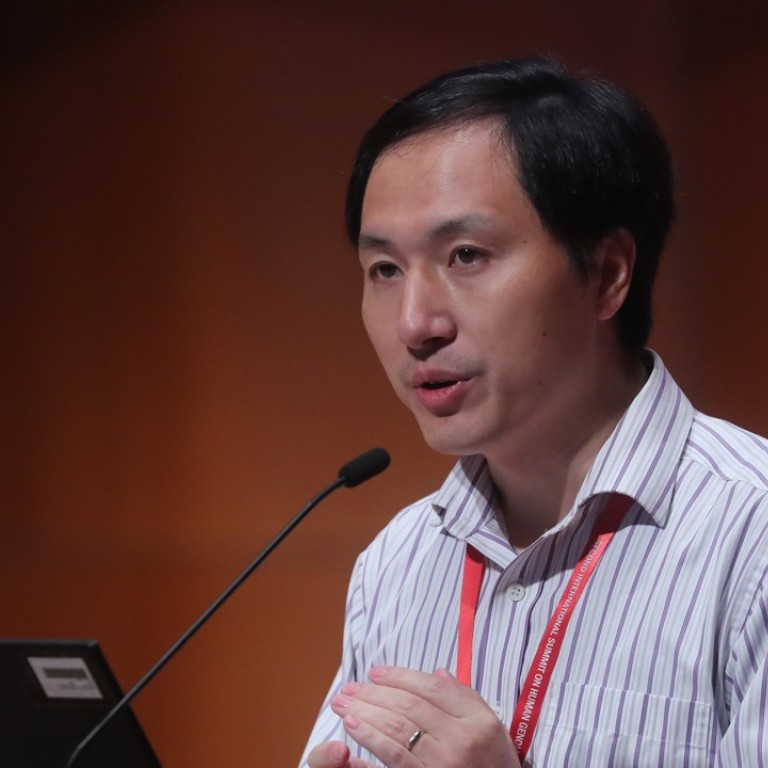
Unrepentant Chinese scientist He Jiankui apologises for sparking global controversy, but says he is proud of his achievement
- Speaking at international conference in Hong Kong, academic says couples who took part in experiment gave informed consent
- Scientist reveals second woman may be pregnant, but does not give details
The Chinese scientist who stunned the world by claiming to have created the first gene-edited babies finally faced his peers and the public on Wednesday, apologising for the storm he unleashed but defending his highly controversial experiment and expressing pride in his achievement.
After first dropping the bombshell in a video posted on the internet that he had engineered the birth of healthy twin girls through altered embryos to ensure they would not contract HIV, He Jiankui – who has been called China’s Frankenstein – went silent for two days. Then on Wednesday he revealed there had been another pregnancy involving a gene-edited baby.
“First, I must apologise that this result leaked unexpectedly, taking it away from the community before being presented immediately at a scientific venue and without the peer review process engaged before this conference,” He told a genome summit in Hong Kong that had become the focus of global attention.
Then he raised eyebrows even further with an additional claim: “There is another one … another potential pregnancy.”
He described it as a chemical pregnancy, suggesting there had been an early miscarriage, but did not provide details.
Who invested in Chinese scientist He Jiankui’s biotech start-ups?
The academic, from the Southern University of Science and Technology in Shenzhen, faced an onslaught of questions from the media and his peers, most of whom have raised doubts about his claims or condemned his brashness, given ethical and medical concerns about a clinical procedure that is banned in most countries, including China.
In the video He said the healthy twin sisters, Lulu and Nana, were born in November from embryos modified to switch off an HIV-related gene.
Scientist at centre of controversy ran second experiment on human embryos
Two days later, he was grilled on the necessity of the experiment and his responsibility for the lives of the gene-edited children, who risked developing unintended mutations and even had the potential to change the gene pool of the human species, according to critics.
Summit organiser Professor David Baltimore, winner of the 1975 Nobel Prize in Physiology or Medicine, went on stage to accuse He of being irresponsible in proceeding with the clinical use of germ line editing with unaddressed safety issues and a lack of universal consensus in society.
“I don’t think it has been a transparent process. We only found out about it after it happened, and after the children were born,” Baltimore said. “I personally don’t think it was medically necessary.”
Robin Lovell-Badge, a scientist from the Francis Crick Institute in London, said: “He obviously thought he was doing a good thing. But I personally feel that he was misguided. He was taking wrong advice.”
Hong Kong summit to discuss regulation in wake of gene-editing scandal
And American biochemist David Liu – a co-inventor of the CRISPR/Cas9 technology that He said he used to alter the gene – said the procedure was unnecessary.
“The father is HIV positive and the mother is HIV negative. You already did sperm washing, and thus you already could generate uninfected embryos that could give rise to uninfected babies,” Liu said at the summit.
The fathers among the seven couples who took part in the project were HIV positive. He said his team had originally enrolled eight couples with HIV-positive fathers and HIV-negative mothers, but one pair dropped out.
“For this specific case, I feel proud actually,” the Chinese scientist said of the twins experiment. “I feel proudest because Mark [the twins’ father] thought he had lost hope for life.”
Responding to criticism about the lack of transparency in his research, He said all the couples had consented and his study was under peer review, having been sent to a journal he did not name.
The parties mentioned in his research have denied any knowledge of He’s project.
He is facing intense pressure back home, with China’s Ministry of Science and Technology investigating whether he has broken the law, and the country’s scientific community joining in the global chorus of concern and condemnation.
He insisted he had consulted overseas scientists during previous international conferences on genome editing.
According to the consent form posted on the website of his lab at the university, participants in the experiment were informed of the procedures and risks. It also mentioned the Shenzhen Luohu Medical Institution as the designated place of delivery, and that the lab would pay a total of 280,000 yuan (US$40,300) for each couple as well as other subsidies.
A second consent document specified plans for follow-up physical examinations, including HIV tests, for the gene-edited babies until the age of 18 years.
Asked whether there had been any need at all to conduct his experiment, He said he had done it for millions of HIV-exposed children.
“They need this protection since an HIV vaccine is not available,” he said.
And would he gene-edit his own baby?
“If it was my baby in the same situation, I would try it first,” was his ready reply.


